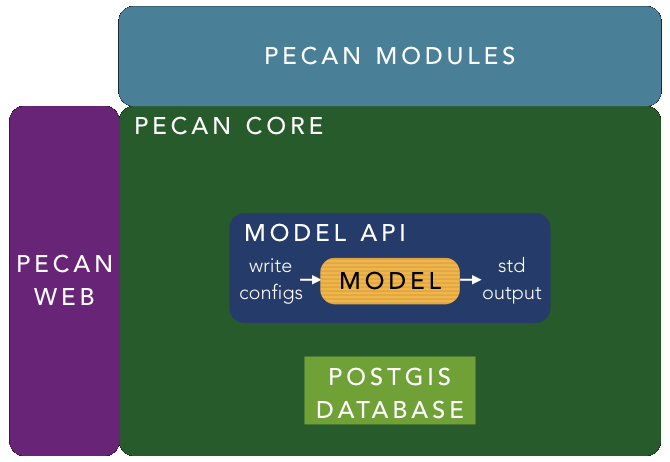1 Project Overview
The Predictive Ecosystem Analyzer (PEcAn) is an integrated informatics toolbox for ecosystem modeling (Dietze et al. 2013, LeBauer et al. 2013). PEcAn consists of:
- An application program interface (API) that encapsulates an ecosystem model, providing a common interface, inputs, and output.
- Core utilities for handling and tracking model runs and the flows of information and uncertainties into and out of models and analyses
- An accessible web-based user interface and visualization tools
- An extensible collection of modules to handle specific types of analyses (sensitivity, uncertainty, ensemble), model-data syntheses (benchmarking, parameter data assimilation, state data assimilation), and data processing (model inputs and data constraints)

This project is motivated by the fact that many of the most pressing questions about global change are limited by our ability to synthesize existing data and strategically prioritize the collection of new data. This project seeks to improve this ability by developing a framework for integrating multiple data sources in a sensible manner.
The workflow system allows ecosystem modeling to be more reproducible, automated, and transparent in terms of operations applied to data, and thus ultimately more comprehensible to both peers and the public. It reduces the redundancy of effort among modeling groups, facilitate collaboration, and make models more accessible the rest of the research community.
PEcAn is not itself an ecosystem model, and it can be used to with a variety of different ecosystem models; integrating a model involves writing a wrapper to convert inputs and outputs to and from the standards used by PEcAn. Currently, PEcAn supports multiple models listed PEcAn Models.
Acknowledgements
The PEcAn project is supported financially by the following:
- National Science Foundation (NSF):
- National Aeronautics and Space Administration (NASA)
- NNX14AH65G
- NNX16AO13H
- 80NSSC17K0711
- Advanced Research Projects Agency-Energy (ARPA-E) DE-AR0000594
- Department of Defense, Strategic Environmental Research and Development Program (DOD-SERDP), grant RC2636
- Energy Biosciences Institute, University of Illinois
- Amazon Web Services (AWS)
- Google Summer of Code
BETYdb is a product of the Energy Biosciences Institute at the University of Illinois at Urbana-Champaign. We gratefully acknowledge the great effort of other researchers who generously made their own data available for further study.
PEcAn is a collaboration among research groups at the Department of Earth And Environment at Boston University, the Energy Biosciences Institute at the University of Illinois, the Image Spatial Data Analysis group at NCSA, the Department of Atmospheric & Oceanic Sciences at the University Wisconsin-Madison, the Terrestrial Ecosystem Science & Technology (TEST) Group at Brookhaven National Laboratory, and the Joint Global Change Research Institute (JGCRI) at the Pacific Northwest National Laboratory.
Any opinions, findings, and conclusions or recommendations expressed in this material are those of the author(s) and do not necessarily reflect the views of the NSF, NASA, Boston University, University of Illinois, Brookhaven National Lab, Pacific National Lab, Battelle, the US Department of Defense, or the US Department of Energy.
PEcAn Publications
Fer I, R Kelly, P Moorcroft, AD Richardson, E Cowdery, MC Dietze. 2018. Linking big models to big data: efficient ecosystem model calibration through Bayesian model emulation. Biogeosciences Discussions doi:10.5194/bg-15-5801-2018
Feng X, Uriarte M, González G, et al. Improving predictions of tropical forest response to climate change through integration of field studies and ecosystem modeling. Glob Change Biol. 2018;24:e213–e232.doi:10.1111/gcb.13863
Dietze, M. C. (2017), Prediction in ecology: a first-principles framework. Ecol Appl, 27: 2048-2060. doi:10.1002/eap.1589
Fisher RA, Koven CD, Anderegg WRL, et al. 2017. Vegetation demographics in Earth System Models: A review of progress and priorities. Glob Change Biol. doi:10.1111/gcb.13910
Rollinson, C. R., Liu, Y., Raiho, A., Moore, D. J.P., McLachlan, J., Bishop, D. A., Dye, A., Matthes, J. H., Hessl, A., Hickler, T., Pederson, N., Poulter, B., Quaife, T., Schaefer, K., Steinkamp, J. and Dietze, M. C. (2017), Emergent climate and CO2 sensitivities of net primary productivity in ecosystem models do not agree with empirical data in temperate forests of eastern North America. Glob Change Biol. Accepted Author Manuscript. doi:10.1111/gcb.13626
LeBauer, D., Kooper, R., Mulrooney, P., Rohde, S., Wang, D., Long, S. P. and Dietze, M. C. (2017), betydb: a yield, trait, and ecosystem service database applied to second-generation bioenergy feedstock production. GCB Bioenergy. doi:10.1111/gcbb.12420
Rogers A, BE Medlyn, J Dukes, G Bonan, S von Caemmerer, MC Dietze, J Kattge, ADB Leakey, LM Mercado, U Niinemets, IC Prentice, SP Serbin, S Sitch, DA Way, S Zaehle. 2017. “A Roadmap for Improving the Representation of Photosynthesis in Earth System Models” New Phytologist 213(1):22-42 doi:10.1111/nph.14283
Shiklomanov. A, MC Dietze, T Viskari, PA Townsend, SP Serbin. 2016 “Quantifying the influences of spectral resolution on uncertainty in leaf trait estimates through a Bayesian approach to RTM inversion” Remote Sensing of the Environment 183: 226-238. doi:10.1016/j.rse.2016.05.023
Viskari et al. 2015 Model-data assimilation of multiple phenological observations to constrain and forecast leaf area index. Ecological Applications 25(2): 546-558. doi:10.1890/14-0497.1
Dietze, M. C., S. P. Serbin, C. Davidson, A. R. Desai, X. Feng, R. Kelly, R. Kooper, D. LeBauer, J. Mantooth, K. McHenry, and D. Wang (2014) A quantitative assessment of a terrestrial biosphere model’s data needs across North American biomes. Journal of Geophysical Research-Biogeosciences doi:10.1002/2013jg002392
LeBauer, D.S., D. Wang, K. Richter, C. Davidson, & M.C. Dietze. (2013). Facilitating feedbacks between field measurements and ecosystem models. Ecological Monographs. doi:10.1890/12-0137.1
Wang, D, D.S. LeBauer, and M.C. Dietze(2013) Predicting yields of short-rotation hybrid poplar (Populus spp.) for the contiguous US through model-data synthesis. Ecological Applications doi:10.1890/12-0854.1
Dietze, M.C., D.S LeBauer, R. Kooper (2013) On improving the communication between models and data. Plant, Cell, & Environment doi:10.1111/pce.12043
Longer / auto-updated list of publications that mention PEcAn’s full name in Google Scholar